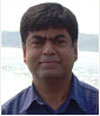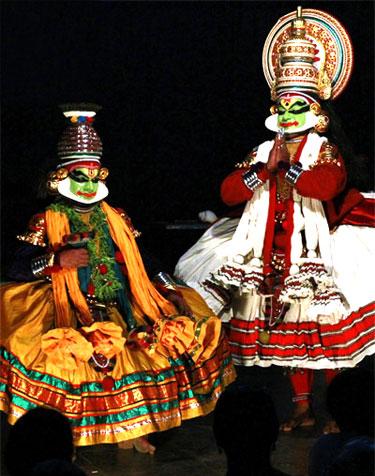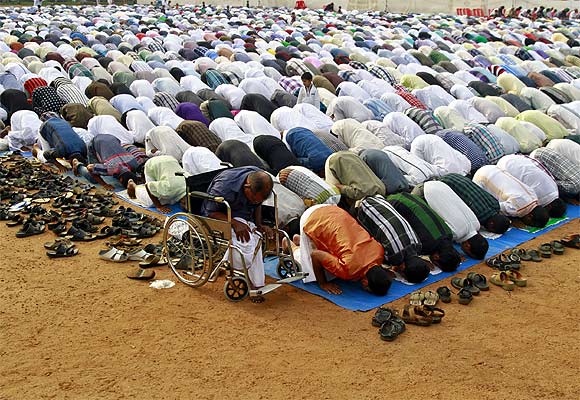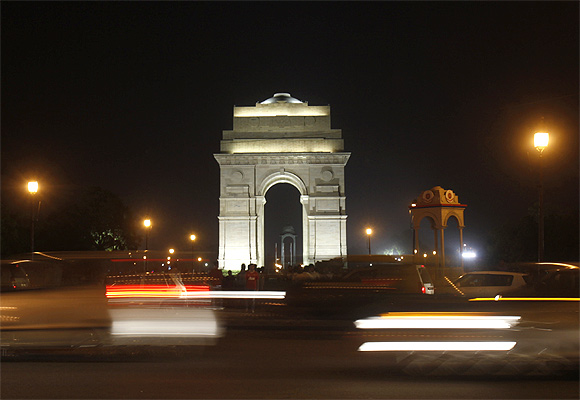 | « Back to article | Print this article |
'India is dominated by the West'
'India may be independent politically and it may even become an economic power like Japan, but it remains and will still remain part of the global capitalist economy and system, dominated and controlled by the West,' says historian J B P More.
Nothing much has changed since Vasco da Gama's time, says historian J B P More.
That is why he holds the view that the Clash of Civilisations, between the West and the rest of the world which started in the 15th century with Vasco da Gama traveling to India and Christopher Columbus stumbling upon America, has continued till today and will continue for many more decades to come.
"I am sure Samuel Huntington (who proposed the Clash of Civilisations theory in a memorable 1993 Foreign Affairs essay) will agree with me," he told Rediff.com's Shobha Warrier in an interview conducted done over e-mail.
 Born and brought up in Pondicherry, More, left, moved to Paris to pursue a BA degree. He later did his PhD in history at the Ecole des Hautes Etudes en Sciences Sociales (the School for Higher Studies in Social Sciences) where his thesis was on the Muslims of Tamil Nadu.
Born and brought up in Pondicherry, More, left, moved to Paris to pursue a BA degree. He later did his PhD in history at the Ecole des Hautes Etudes en Sciences Sociales (the School for Higher Studies in Social Sciences) where his thesis was on the Muslims of Tamil Nadu.
He has published more than a dozen books with quite a few on the Muslims of Kerala and Tamil Nadu. In the first part of his interview to Rediff.com, he provides insights into the Muslims of Kerala and the consequences of Vasco da Gama's arrival in India.
Do you feel Indian (and Third World) history is seen always from the Western perspective?
Yes. Indian history is seen most of the time from the Western perspective. It is a colonial legacy.
Even after the colonial period, many Indian historians continue to work within the Western ideological frameworks and methodologies. They have not evolved anything worthwhile of their own, which is not Western. Therefore, they are bound to look at history from a Western perspective.
Besides, even after decolonisation, Western scholars continue to work on Indian history and society in greater numbers. They produce innumerable books from the Western perspective.
They have even resorted to collaboration and cooperation with like-minded Indian scholars and institutions after Independence in 1947, (which is part of the globalisation agenda of the West), thus ensuring their hegemony in the Indian intellectual and historical world even after decolonisation.
This has contributed largely to look at history greatly from the Western perspective, which is thought to be universal.
Most Western scholars never adopt a completely neutral attitude towards history and society and the Indians largely follow it.
A historian has to view history as an outsider, standing above all group interests. He needs to be uncommitted.
Please click Next to read more...
'Muslims in Kerala ferociously resisted the European arrival in Malabar'
You have written a book on the origin and early history of Muslims in Kerala. How did you get interested in the subject?
My PhD thesis was about the Muslims of Tamil Nadu. I had worked and published extensively on them and the Dravidians.
I was also interested in French colonial history in India, particularly Mahe on the Malabar Coast.
I went to Mahe. This led me to write a book on the history and freedom movement in Mahe.
From Mahe I got the idea to write a book on the Muslims of Kerala, their origin and early history. I worked on it for several years before it was published in 2011.
What revelations came to light when you started your study on the origin of Muslims in Kerala?
The Muslims of Kerala owe their origin to peaceful Arab traders, unlike North Indian/Pakistani Muslims who are the result of invasions by Arab, Turkish, Afghan and Mongol armies.
They were a peaceful community, subjects of the Zamorin of Calicut and other Kerala kings until the arrival of Vasco da Gama and the Portuguese, followed by other Europeans.
The policies and values of the Portuguese and later the English transformed this peaceful community into a largely militant community during the colonial period.
They were probably the first among the Indians to realise the colonial implications of European arrival in Malabar and resisted it ferociously tooth and nail.
Sheikh Zainuddin's work Tohfut ul Mujahdeen of the 16th century, which is the first historical work of South India, is a standing testimony of that.
It is a rare and pioneering, foundation document of resistance to colonialism and slavery, though written from the Islamic standpoint.
It must be included in the list of UNESCO heritage documents, rather than the recent inclusion in that list of the travel account of Vasco da Gama's first voyage to India, replete with factual errors, which remains nevertheless the foundation document of colonialism.
Did Arabs travel to the Malabar Coast and spread Islam as early as the 7th century?
There is no evidence in Arab, Persian and Chinese travel accounts and other literature, not to speak of Sanskrit or Tamil literature that the Arabs frequented the Malabar Coast in the 7th century.
But there is evidence of their presence in Malabar from the 9th century.
In my book on the origin of Muslims of Kerala, I have proved convincingly on the origin of Muslims that there was no conversion of the Chera king, Cheraman Perumal, to Islam in the 7th century or in the 9th century as claimed by some scholars or in the 12th century as claimed by M G S Narayanan.
Please click Next to read more...
'Vasco da Gama's arrival turned the Indian Ocean region into an arena of conflict'
You say Samuel Huntington got it wrong to say that the Clash of Civilisations, essentially Western and Muslim, started after the Cold War ended.
You say it began with Vasco da Gama setting foot in India and Christopher Columbus in the Americas.
Are the conflicts in the world from the 15th century onwards a continuation of this theme?
For Huntington, the ideological clash is over with the fall of the Soviet Union. This has brought about a Clash of Civilisations on the basis of culture and ethnicity.
Huntington attributes a very restricted meaning and time-frame to the notion of the Clash of Civilisations.
I think the Clash of Civilisations, which involves all aspects of the life and existence of people, started way back in the late 15th century with the arrival of Vasco da Gama in the Indian Ocean region and Malabar and Columbus in the Americas.
We know about the tragic atrocities that fell upon the Red Indian civilisations due to Columbus' intrusion into America.
Whole peoples and civilisations, which were a legacy of humanity, were wiped out by the European colonisers in favour of their own civilisation.
In the East, with the arrival of Vasco da Gama, we know that the largely peaceful Indian Ocean region was turned overnight into an arena of conflict and tension, which led to the colonisation of India and much of the Eastern world.
Eventually, the European colonisers had an upper hand in this tussle due to the sophisticated and superior arms and ammunition and the better developed navigation vessels that they possessed, with which they could impose their will on the high seas or bombard or raze to the ground any coastal town, as it was the case with Calicut in 1502.
They did not win India or the Red Indian continent with their values or way of life. Samuel Huntington himself accepted this and had held that the West won the world not with their values, but due to their superiority in applying organised violence.
Thus, the Clash of Civilisations where the Europeans held the upper hand due to superior arms at their disposal started in the 15th century.
This clash continued during the colonial period when the civilisation of the coloniser in the political, economic and cultural fields was imposed upon the colonised.
Please click Next to read more...
'India still revolves around the structures put in place by the colonisers'
Shobha Warrier's interview with historian J B P More continues...
India became part of the globalised capitalist economy and power structure, dominated by the West.
Nothing much has changed even after decolonisation. India may be independent politically and it may even become an economic power like Japan, but it still remains and will still remain part of the global capitalist economy and system, dominated and controlled by the West.
India still revolves around the economic, political and ideological structures put in place by the colonisers, where power is concentrated in the hands of a few.
Naturally Western culture has become more and more pervasive in every field.
One might think that the dominance of the Western powers ended with decolonisation. Nothing is more erroneous than this thought.
The Western powers still dominate the oceans by the force of their arms and ammunition, their nuclear bombs, fighter jets and navigation vessels.
This, more than their values and ideas, assures their dominance in the world and the continued predominance and existence of the globalised capitalist economy, dominated and controlled by them and their ideological allies.
In this respect, nothing much has changed since Vasco da Gama's time.
That is why I hold that a new era of Clash of Civilisations, between the West and the rest of the world started in the 15th century with Vasco da Gama coming to India and Columbus stumbling upon America, and has continued till today and will continue for many more decades to come.
I am sure Samuel Huntington will agree with me.
Coming to Western values, ideas and ideologies, I would say that many of them are fundamentally irrational and unfounded. If they had been truly rational and just, there would not be so much confusion and conflict, killings and massacres, injustices and inequalities, not just in India, but all over the world.
Part 2 of the interview: 'Vasco da Gama needs to be tried for crimes against humanity'



